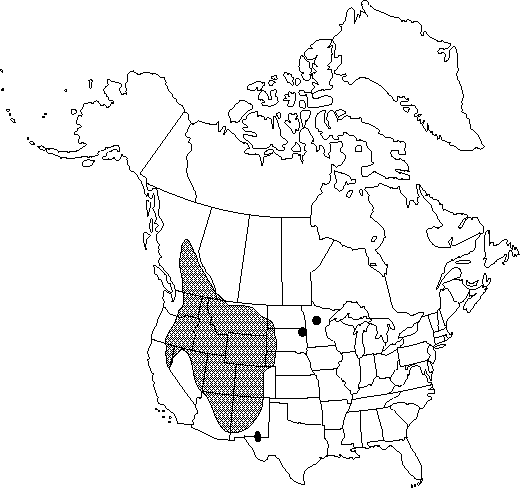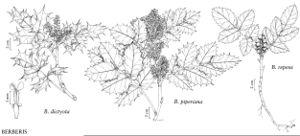Difference between revisions of "Berberis repens"
Bot. Reg., plate 1176. 1828.
FNA>Volume Importer |
imported>Volume Importer |
||
| (7 intermediate revisions by 2 users not shown) | |||
| Line 12: | Line 12: | ||
}}{{Treatment/ID/Special_status | }}{{Treatment/ID/Special_status | ||
|code=F | |code=F | ||
| − | |label= | + | |label=Illustrated |
}} | }} | ||
|basionyms= | |basionyms= | ||
| Line 18: | Line 18: | ||
|name=Berberis aquifolium var. repens | |name=Berberis aquifolium var. repens | ||
|authority=(Lindley) Scoggan | |authority=(Lindley) Scoggan | ||
| − | }}{{Treatment/ID/Synonym | + | |rank=variety |
| + | }} {{Treatment/ID/Synonym | ||
|name=Berberis sonnei | |name=Berberis sonnei | ||
|authority=(Abrams) McMinn | |authority=(Abrams) McMinn | ||
| − | }}{{Treatment/ID/Synonym | + | |rank=species |
| + | }} {{Treatment/ID/Synonym | ||
|name=Mahonia repens | |name=Mahonia repens | ||
|authority=(Lindley) G. Don | |authority=(Lindley) G. Don | ||
| − | }}{{Treatment/ID/Synonym | + | |rank=species |
| + | }} {{Treatment/ID/Synonym | ||
|name=Mahonia sonnei | |name=Mahonia sonnei | ||
|authority=Abrams | |authority=Abrams | ||
| + | |rank=species | ||
}} | }} | ||
|hierarchy=Berberidaceae;Berberis;Berberis repens | |hierarchy=Berberidaceae;Berberis;Berberis repens | ||
| Line 35: | Line 39: | ||
}}<!-- | }}<!-- | ||
| − | --><span class="statement" id="st- | + | --><span class="statement" id="st-undefined" data-properties=""><b>Shrubs,</b> evergreen, 0.02-0.2(-0.6) m. <b>Stems</b> monomorphic, usually without short axillary shoots. <b>Bark</b> of 2d-year stems grayish or purplish brown, glabrous. <b>Bud</b> scales 3-8 mm, deciduous. <b>Spines</b> absent. <b>Leaves</b> (3-)5-7-foliolate; petioles (1-)3-9 cm. <b>Leaflet</b> blades thin and flexible; surfaces abaxially dull, papillose, adaxially dull, rarely glossy, somewhat glaucous; terminal leaflet stalked, blade 3.2-9.5 × 2.3-6 cm, 1.2-2.2(-2.5) times as long as wide; lateral leaflets ovate or elliptic, 1(-3)-veined from base, base rounded to obtuse or truncate, margins plane, toothed, with 6-24 teeth 0.5-3 mm tipped with spines to 0.6-2.8 × 0.1-0.25 mm, apex rounded, rarely obtuse or even broadly acute. <b>Inflorescences</b> racemose, dense, 25-50-flowered, 3-10 cm; bracteoles membranous, apex rounded to obtuse or broadly acute. <b>Anther</b> filaments with distal pair of recurved lateral teeth. <b>Berries</b> blue, glaucous, oblong-ovoid, 6-10 mm, juicy, solid. <b>2n</b> = 28.</span><!-- |
-->{{Treatment/Body | -->{{Treatment/Body | ||
| Line 42: | Line 46: | ||
|elevation=200-3000 m | |elevation=200-3000 m | ||
|distribution=Alta.;B.C.;Ariz.;Calif.;Colo.;Idaho;Minn.;Mont.;Nebr.;Nev.;N.Mex.;N.Dak.;Oreg.;S.Dak.;Tex.;Utah;Wash.;Wyo. | |distribution=Alta.;B.C.;Ariz.;Calif.;Colo.;Idaho;Minn.;Mont.;Nebr.;Nev.;N.Mex.;N.Dak.;Oreg.;S.Dak.;Tex.;Utah;Wash.;Wyo. | ||
| − | |discussion=<p>Berberis sonnei was described based on plants with relatively narrow, rather shiny leaflets collected by Sonne in Truckee, California. Subsequent collections from this population show the morphology typical of B. repens; Sonne's collections evidently are an aberrant form of this species.</p><!-- | + | |discussion=<p><i>Berberis</i> sonnei was described based on plants with relatively narrow, rather shiny leaflets collected by Sonne in Truckee, California. Subsequent collections from this population show the morphology typical of <i>B. repens</i>; Sonne's collections evidently are an aberrant form of this species.</p><!-- |
| − | --><p>Berberis repens is resistant to infection by Puccinia graminis.</p><!-- | + | --><p><i>Berberis repens</i> is resistant to infection by Puccinia graminis.</p><!-- |
| − | --><p>Various Native American tribes used preparations of the roots of Berberis repens to treat stomach troubles, to prevent bloody dysentary, and as a blood purifier; mixed with whiskey, it was used for bladder problems, venereal diseases, general aches, and kidney problems; and preparations made from the entire plant served as a cure-all and as a lotion for scorpion bites (D. E. Moermann 1986).</p> | + | --><p>Various Native American tribes used preparations of the roots of <i>Berberis repens</i> to treat stomach troubles, to prevent bloody dysentary, and as a blood purifier; mixed with whiskey, it was used for bladder problems, venereal diseases, general aches, and kidney problems; and preparations made from the entire plant served as a cure-all and as a lotion for scorpion bites (D. E. Moermann 1986).</p> |
|tables= | |tables= | ||
|references= | |references= | ||
| Line 53: | Line 57: | ||
-->{{#Taxon: | -->{{#Taxon: | ||
name=Berberis repens | name=Berberis repens | ||
| − | |||
|authority=Lindley | |authority=Lindley | ||
|rank=species | |rank=species | ||
| Line 67: | Line 70: | ||
|publication title=Bot. Reg., plate | |publication title=Bot. Reg., plate | ||
|publication year=1828 | |publication year=1828 | ||
| − | |special status=Endemic; | + | |special status=Endemic;Illustrated |
| − | |source xml=https:// | + | |source xml=https://bitbucket.org/aafc-mbb/fna-data-curation/src/2e0870ddd59836b60bcf96646a41e87ea5a5943a/coarse_grained_fna_xml/V3/V3_600.xml |
|genus=Berberis | |genus=Berberis | ||
|species=Berberis repens | |species=Berberis repens | ||
| − | |||
| − | |||
| − | |||
| − | |||
| − | |||
| − | |||
| − | |||
| − | |||
| − | |||
| − | |||
| − | |||
| − | |||
| − | |||
| − | |||
| − | |||
| − | |||
| − | |||
| − | |||
| − | |||
| − | |||
| − | |||
| − | |||
| − | |||
| − | |||
| − | |||
| − | |||
| − | |||
| − | |||
| − | |||
| − | |||
| − | |||
| − | |||
| − | |||
| − | |||
| − | |||
| − | |||
| − | |||
| − | |||
| − | |||
| − | |||
| − | |||
| − | |||
| − | |||
| − | |||
| − | |||
}}<!-- | }}<!-- | ||
-->[[Category:Treatment]][[Category:Berberis]] | -->[[Category:Treatment]][[Category:Berberis]] | ||
Latest revision as of 22:50, 5 November 2020
Shrubs, evergreen, 0.02-0.2(-0.6) m. Stems monomorphic, usually without short axillary shoots. Bark of 2d-year stems grayish or purplish brown, glabrous. Bud scales 3-8 mm, deciduous. Spines absent. Leaves (3-)5-7-foliolate; petioles (1-)3-9 cm. Leaflet blades thin and flexible; surfaces abaxially dull, papillose, adaxially dull, rarely glossy, somewhat glaucous; terminal leaflet stalked, blade 3.2-9.5 × 2.3-6 cm, 1.2-2.2(-2.5) times as long as wide; lateral leaflets ovate or elliptic, 1(-3)-veined from base, base rounded to obtuse or truncate, margins plane, toothed, with 6-24 teeth 0.5-3 mm tipped with spines to 0.6-2.8 × 0.1-0.25 mm, apex rounded, rarely obtuse or even broadly acute. Inflorescences racemose, dense, 25-50-flowered, 3-10 cm; bracteoles membranous, apex rounded to obtuse or broadly acute. Anther filaments with distal pair of recurved lateral teeth. Berries blue, glaucous, oblong-ovoid, 6-10 mm, juicy, solid. 2n = 28.
Phenology: Flowering spring (Apr–Jun).
Habitat: Open forest, shrubland, and grassland
Elevation: 200-3000 m
Distribution

Alta., B.C., Ariz., Calif., Colo., Idaho, Minn., Mont., Nebr., Nev., N.Mex., N.Dak., Oreg., S.Dak., Tex., Utah, Wash., Wyo.
Discussion
Berberis sonnei was described based on plants with relatively narrow, rather shiny leaflets collected by Sonne in Truckee, California. Subsequent collections from this population show the morphology typical of B. repens; Sonne's collections evidently are an aberrant form of this species.
Berberis repens is resistant to infection by Puccinia graminis.
Various Native American tribes used preparations of the roots of Berberis repens to treat stomach troubles, to prevent bloody dysentary, and as a blood purifier; mixed with whiskey, it was used for bladder problems, venereal diseases, general aches, and kidney problems; and preparations made from the entire plant served as a cure-all and as a lotion for scorpion bites (D. E. Moermann 1986).
Selected References
None.
